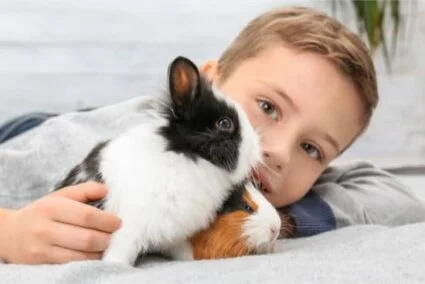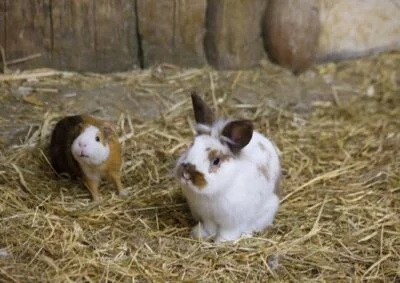Choosing the right pet for your family can be a difficult balancing act. There is no shortage of options, and some pets seem similar. Take rabbits and guinea pigs, for example. Anybody contemplating adopting a small animal as a pet will need to consider the pros and cons.
Rabbits have more personality and make better companion pets. They also have more complex needs, so guinea pigs are less of a responsibility than rabbits. If you have time and can adhere to a schedule, rabbits are excellent company. Guinea pigs are less demanding family pets.
There are many other differences between guinea pigs and rabbits, as well as some similarities. Life expectancy, expense, energy levels, and housing needs all vary between these animals. This guide discusses everything you’ll need to know about pet rabbits vs. guinea pigs as pets.
Similarities Between Rabbits and Guinea Pigs
On paper, there are few differences between keeping rabbits and guinea pigs as pets. Some of the similarities between these two species include:
- Housing. Rabbits and guinea pigs both need to live in a warm, spacious hutch.
- Maintenance. Both pets must have their hutches cleaned regularly.
- Company. Both of these species are very social. If you are going to keep rabbits or guinea pigs as pets, adopt at least two. This is why you should get two pet rabbits.
- Friendliness. They are both affectionate once they bond with an owner. This can be a slow process though, so you’ll need to be patient.
- Grooming. Both require maintenance, so you should groom either pet at least once daily.
Never assume that rabbits and guinea pigs have identical needs. Every animal is different, and there are distinctions between the species.
Differences Between Rabbits and Guinea Pigs
- Location. Rabbits are so social that they’re happier indoors. Here’s some advice on how to move an indoor rabbit outside. Guinea pigs, meanwhile, are better off living outside. Note that guinea pigs are intolerant of the cold and will need a warm area.
- Diet. The nutritional needs of rabbits and guinea pigs vary. Both enjoy fresh vegetables as a treat, and like to chew hay. Their core feed must be species-specific.
- Size. The average house rabbit is much larger than a guinea pig. This will lead to different size requirements in feeding and housing.
- Mobility. Rabbits have very strong hind legs, and love to jump. This means that their home must have a roof to contain them. Guinea pigs don’t leap, but a durable roof will still protect them from wild predators (foxes, raccoons, birds of prey, etc.)
- Sleep. A rabbit will typically sleep for around eight hours straight, then wake up filled with energy. Guinea pigs prefer to take short naps throughout the day and night.
- Life Expectancy. Guinea pigs do not live as long as rabbits. The average lifespan is between 5 and 8 years. A well cared for rabbit can easily reach 12 years of age, sometimes older.
As you can tell, there are pros and cons to both pets. Let’s look at each of these in more detail.
Advantages of Keeping Rabbits as Pets
- Rabbits are adorable. No further explanation needed here. If the sight of a fluffy bunny twitching their nose doesn’t melt your heart, what will? Rabbits also have real personality, so their antics will consistently amuse.
- Rabbits are quiet. Rabbits do not bark, squeak, meow, tweet or make much noise at all. If you’re going to keep your rabbits indoors, this could be a deal-breaker.
- Rabbits love to be petted. Once you have bonded with a bunny, they’ll enjoy being petted. As with all furry pets, this interaction can be a great stress-buster.
- Rabbits are comparatively clean. Rabbits groom themselves regularly, and can be trained to use a litter tray. You’ll need to groom and clean them daily, but they’re not dirty animals.
Disadvantages of Keeping Rabbits as Pets
Before adopting rabbits, ensure that you are ready for the responsibility. It’s a misconception that rabbits are easy, low-maintenance pets. They have a variety of needs that must be met.
- Rabbits need constant company. Rabbits are not aloof and independent. Wild bunnies live in large groups, and need company when domesticated. Keep multiple rabbits, or be prepared to entertain yours regularly.
- Rabbits need exercise. Just because you don’t take a rabbit for a walk on a leash, they’re not lazy. Bunnies need 4 hours per day of exercise – which means running free.
- Rabbits can be destructive. Letting your rabbit run free around the house will amuse them. However, they’ll also need to be observed. Rabbits will chew anything they encounter.
- Rabbits can be aggressive. If a rabbit becomes jealous or aggressive, they are troublesome.
- Rabbits can be expensive pets. Your bunny will need a large home, and lots of toys and comfort. Veterinary bills can also pile up, as rabbits are prone to health conditions.
If this sounds like excessive work, you may wish to consider guinea pigs as alternative pets. As with rabbits, there are pros and cons to guinea pigs as pets.

Advantages of Keeping Guinea Pigs as Pets
When considering small pets to teach your children responsibility, guinea pigs can be a great option. These animals are an endless source of amusement, and have many positives.
- Guinea pigs are gentle. One of the main risks of introducing children to animals is the risk of bites and scratches. Guinea pigs tend to be gentle, and will not attack unprovoked.
- Guinea pigs are adaptable. Many pets struggle with changes to their routine, or surroundings. Guinea pigs are generally happy to get on with things and roll with the tide.
- Guinea pigs don’t need to roam free. As they’re small, and potential prey, they like to stay in their hutch. Provided they have space to run and play, they’ll be content staying at home.
- Guinea pigs are sturdy and durable. Vet bills, insurance, and vaccinations are expensive. Thankfully, guinea pigs are not prone to sickness.
- Guinea pigs are small and mobile. Guinea pigs are larger pets than mice and hamsters, but still very small and portable. It’s easier to move them around for play and hutch maintenance.
Disadvantages of Keeping Guinea Pigs as Pets
Before bringing guinea pigs into your family, consider whether your home environment is suitable. While these animals make excellent pets, they do have needs that must be met.
- Guinea pigs are shy. These pets are very small, and vulnerable. This means it may take time to build their trust. If you’re seeking a companion pet, a guinea pig may not be suitable.
- Guinea pigs tend to smell. Guinea pigs like to mark their territory, which means their terrain gets pretty stinky. You’ll have to do a lot of cleaning, and that may offend a sensitive nose.
- Guinea pigs can be noisy. A group of guinea pigs living together can make quite the racket. These animals chirp and squeak, especially at night. This may interrupt your sleep.
- Guinea pigs need a particular home environment. A guinea pig’s hutch must be kept warm, cleaned regularly, and offer entertainment. They love to run, chew and dig, and need a sizeable environment that permits these activities.
- Guinea pigs live for around six to eight years. Guinea pigs live long enough to become family, but not as long as you’d like. It’s heartbreaking when they pass away.
You will need to weight up these pros and cons, and decide whether guinea pigs are the pets for you. Equipped with this information, you may decide that your lifestyle is better suited to pet rabbits.
Are Rabbits or Guinea Pigs More Affectionate?
Both of these animals can be affectionate and cuddly once bonded. As Pet Comments explains, guinea pigs are naturally warier.
A guinea pig that bonds with their owner will enjoy petting and playtime. They may even seek out a human for such interaction. As a rule, they will always remain wary. Rabbits, meanwhile, will make you earn their love and affection. Just like guinea pigs, bunnies will be cautious at first.
Once you manage to bond with your rabbit, you’ll have a new best friend. Your pet will rarely leave your side given a choice, as bunnies are social. Expect constant requests for petting and attention.
This is the one note of caution to sound around rabbits. They can be very demanding, and easily become jealous. You’ll need to ensure you can spare the time to return your rabbit’s affection.
If you’re worried about this, guinea pigs may be a safer option. They are adaptable, gladly accepting attention when it comes but less likely to actively seek it.
Are Rabbits Smarter Than Guinea Pigs?
Intelligence is subjective when it comes to small animals. Neither rabbits or guinea pigs will be working for NASA any time soon. You could make an argument for either animal being smarter.
In one sense, there’s an argument that rabbits have the edge here. Bunnies understand more commands, and basic words. This makes them easier to train, and to play games with. However, they’re also more emotional than guinea pigs.
This means that it could be argued that guinea pigs have more intelligence. A guinea pig will never behave aggressively around a human that is gentle with them. They understand who is friend and foe, and react accordingly.

Do Rabbits or Guinea Pigs Smell Worse?
In theory, rabbits have the edge here. While rabbit urine smells stronger than that of a guinea pig, bunnies can be litter trained. Guinea pigs eliminate at will, wherever they please.
Guinea pigs also spray their home regularly. This is because they have such poor eyesight. Guinea pigs use their superior sense of smell to get their bearings, and move freely.
Rabbits are also generally clean animals. They groom themselves regularly, and keep themselves free of body odor. Rabbit poop should also be odorless. If it’s not, the bunny is likely unwell.
Both pets will need to have theory hutches cleaned regularly. More guinea pig owners than rabbits bemoan the smell of their pets, however.
Can Rabbits and Guinea Pigs Live Together?
These animals have often shared living spaces in the past. This is becoming less common, though. It’s best to keep rabbits and guinea pigs separate.
The main reason for this is their size discrepancy. Rabbits are very dominant animals, and won’t think twice about throwing their weight around.
As they’re bigger than guinea pigs, they’ll often end up bullying them. As naturally shy creatures, this will make the guinea pigs miserable. This is not fair on these gentle, unassuming animals.
Of course, that isn’t to say that guinea pigs and rabbits can never be friends. This leads to another set of issues, though.
When rabbits bond to another animal, they become very attached. Unfortunately, bunnies often live twice as long as guinea pigs. This could leave a rabbit feeling very withdrawn and depressed at the loss of their companions.
Pet rabbits vs. guinea pigs as pets is a long-standing debate. There are certainly pros and cons to each animal. Which is best your family depends on your circumstances.
Take the time to consider what is most important to you, and act accordingly. Are you seeking a loving pet with bags of personality, or a lower-maintenance alternative? That’s the core difference between the species.
In a nutshell, rabbits are as outgoing as guinea pigs are shy and retiring. Study your reaction to this, and you’ll have an idea of which pet suits you best.

